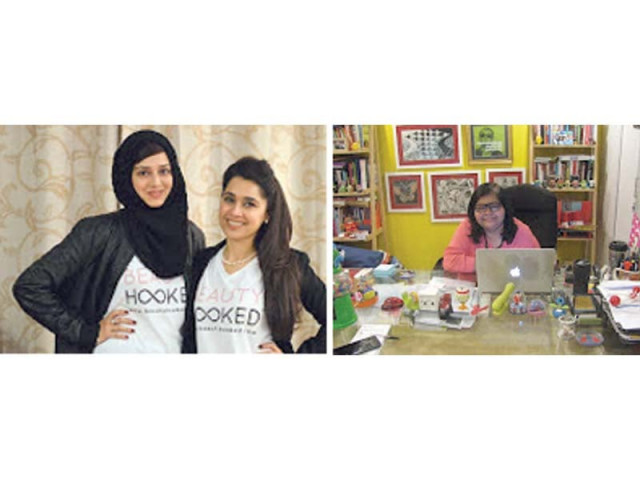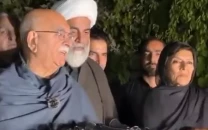Women seek leadership in Pakistani startup culture
To create a more female-friendly environment, women in technology are opening their own business

Sahr Said, CEO and Sidra Talha, Head of Operations & Cofounder at Beauty Hooked. Jehan Ara, founder of Nest I/O, is pushing women to apply for the incubator. PHOTO: AROOSA SHAUKAT AND LIGIA AGUILHAR
When Jehan Ara opened her startup incubator Nest I/O last year in Karachi, only one woman applied in the first batch. In the latest one, however, 35% of the applicants were women.
For Ara, the ongoing effort to bring more women in the technology sector makes it even more challenging in an environment lacking due support.
Pakistani entrepreneurs help farmers get more milk out of their cattle
President of Pakistan Software Houses Association for IT (P@sha), Ara started her own technology company during the mid 1990s. She comes from a generation of female technologists who helped shape the Pakistani IT industry and brought more women to the job market. Since then many women have made it to the corporate world. But, according to Ara, they still need to forge a system that provides a support structure to allow women to break barriers and get to the top.
“We have women in leadership [roles] but it is [still] not enough,” she says.
As one of the first female leaders in the local IT sector, she felt it was time to act. Ara went to universities around Pakistan to promote the Karachi-based incubator and push women to apply. “Technology companies still don’t provide women with flexible working hours,” she says. According to Ara, facilities like day care and transportation are still lacking in the sector. “This is why I have been telling women they have to start their own businesses in technology,” she says.
With the rise of the Pakistani startup scene over the past few years, many women in technology are finding their way to the top.
“The workplaces in Pakistan are not very child-friendly which is what makes it difficult for the mothers to become productive at work,” says Dr Umar Saif, founder of Plan9, Pakistan’s largest startup incubator, and chairman of the Punjab Information Technology Board. “I believe internet and ecommerce have leveraged the field for female entrepreneurs. While in a traditional business you have to interact with your clientele, over the internet you can do your business from your house, which makes it easier for females.”
Some female entrepreneurs
Wajiha Kashan is one of the examples of Pakistan’s new generation of female entrepreneurs. After working in the software industry for years, she decided to make her dream of being an administrator come true. The opportunity to become an entrepreneur chanced upon her after her marriage. In partnership with her husband, also one of her former subordinates, she went on to create three startups: a peer-to-peer sharing consignment store Affordable.pk, the digital design agency Concept Beans and the consultancy agency Simple Media.
Journey of a backbencher at a government school to a seat in UN
“My husband and I started working on our first business third day into our marriage. We bought a computer from the gift money we got at our wedding and started working from our bedroom,” she said. Today she manages a 16-hour work schedule with the help of her family that takes care of their two children.
More incentive to female leadership also helps Pakistan avoid some of its brain drain. An example is Sahr Said, who after completion of a two-year MBA in Cornell University, turned down opportunities in the US to become an entrepreneur in her own country. Last year she co-founded Beauty Hooked, a startup that helps Pakistani women book beauty services.
“The tech environment in Pakistan is very conducive for women, more than any other employment circle,” she said.
Because she is a woman, Sahr says mentors are more open towards helping her. She finds this important as she needs the expertise and networking to attract investors to her business. “There is a certain type of individual in the startup industry that is very educated and driven and they don’t care about stereotypes, because stereotypes come with the passing of generations.” With the rise of more female entrepreneurs like her, Sahr expects to help the industry stay away of stereotypes.
Unbalance
The gender equality issue has been a major problem for most developed countries. In the US women make it for 59% of workforce, but only 15.6% work in IT, according to the latest Census data. In Pakistan, females correspond to 25% of the workforce, according to the World Bank, and around 14% work in the IT sector, according to P@sha.
But the Pakistani gender issue is more complex. The 2014 Gender Global Entrepreneurship and Development Index, a report on women entrepreneurship sponsored by Dell, ranked Pakistan 30 out of 31 countries from all the continents for favorable conditions to promote female entrepreneurship.
“Pakistan needs to focus on improving fundamental issues such as women’s rights, women’s access to resources such as education and bank accounts, women’s access to broader labor force sectors as well as improving the business regulatory environment,” says the report. According to it, only 3% of Pakistan’s management positions are held by women, versus 59% in Jamaica and 43% in the US.
Some Pakistani companies are trying to make a difference. At We R Play studios, a videogame company in Islamabad, 42% of the workforce is female. The company offers three-months paid maternity leave and allows female staff to work from home.
“After launching in 2010, the first five hires were men,”says Mohammed Usman Khan, head of marketing at We R Play. Mohsin Afzal, the CEO, then recognised the need to recruit women early in the company’s life in what he describes as an effort to develop a female-friendly work culture as the company grew. “Females definitely bring in a lot of diversity. They seem to take their jobs as leads with more responsibility and pay more attention to hiccups. All our Quality Assurance projects are currently led by females,” says Afzal.
Opportunity
Statistically, women form a strong qualified workforce in the IT sector. In Karachi’s NED University of Engineering and Technology, there are 53% of female students earning their Bachelor of Science in Computer Science & Information Technology programme and 63% in the Bachelor of Engineering in Software Engineering programme.
Startup wins $20m project, will install 5,000 vending machines
“The challenge for Pakistani women is that there is a strong family culture that worries about girl’s safety and security. It is difficult for many girls to pursue high education because they will marry early. We need a cultural shift,” says Sheba Najmi, founder of Code for Pakistan - a group that teaches digital skills to encourage more people, including women, to develop digital solutions to many of the country’s problems.
A Stanford University grad,Najmi currently works in the technology industry in the Bay Area, in the US.
“Being a woman from Pakistan I feel there are enormous opportunities because it is kind of not-great for women everywhere. In Silicon Valley the system is not designed with motherhood in mind, the barriers are similar”, she says. “In Pakistan there is not a bro culture like in Silicon Valley. Coworkers treat you well and in schools, girls generally outshine boys.”
A recent survey conducted with support of Stanford University reveals that 60% of women working in Silicon Valley have experienced some kind of harassment in the workplace. In Pakistan, though, a 2012 survey made by P@sha shows that 55% of women in the Pakistani IT sector consider it a good industry to work because of the opposite: there is no harassment and they feel highly appreciated.
Arusha Imtiaz, a 25-year-old who recently graduated from Pakistani accelerator Plan 9, says that although the IT and startup industries are female-friendly, founders from both sexes will struggle with limitations from the country’s young startup scene. She recently set up an office for her startup, SMAC Factory, a system that connects parents with teachers to provide more information about their children’s education.
“If you are not part of an environment as in an accelerator, hiring is very difficult, because Pakistan does not have a culture where people work in their rooms. There are challenges raising investment, finding mentors and a good team, especially if you are young or a female,” she said. Her company recently received an investment that valued it at $2 million.
The 25-year old entrepreneur who looks at Mark Zuckerberg for inspiration says all Pakistani women need to thrive is equal opportunities. “But I don’t think women need a movement. I am totally against treating men and women differently because that is how you start creating the differences yourself. What we need is to create the same opportunities for women and men.”
The article is a joint project of the Medill School of Journalism and The Express Tribune
Published in The Express Tribune, May 9th, 2016.
Like Business on Facebook, follow @TribuneBiz on Twitter to stay informed and join in the conversation.



















COMMENTS
Comments are moderated and generally will be posted if they are on-topic and not abusive.
For more information, please see our Comments FAQ